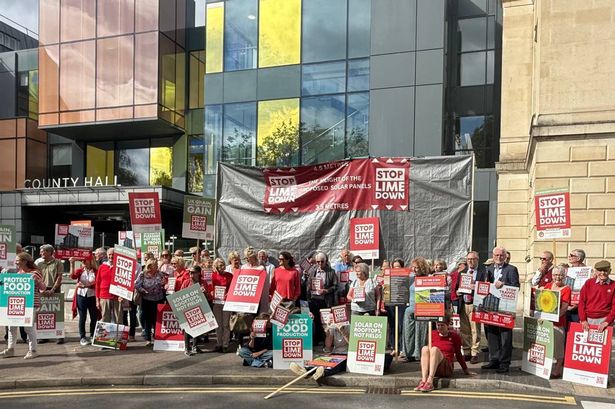Business
Plans Unveiled for Controversial 500 MW Solar Farm in Wiltshire

Plans for a significant solar energy project have been submitted by Lime Down Solar Park Limited, proposing the construction of a 500 megawatt solar farm in Wiltshire. The proposed site is located to the north of the M4 motorway near Malmesbury and aims to generate renewable energy sufficient to power approximately 115,000 homes.
If approved, the solar farm will cover an extensive area measuring four miles wide and two miles deep. The solar panels will be 4.5 metres tall, comparable to the height of a double-decker bus, marking a first for the United Kingdom. In addition, the project includes plans for multiple battery storage systems, with one potentially reaching the height of a five-storey building.
A critical component of the development involves a 20-kilometre cable that will connect the solar farm to the substation at Melksham, requiring a corridor 60 metres wide. This cable will traverse under the M4 motorway and the Bristol-to-London railway line.
Concerns regarding the scale and nature of the project have been raised by local officials. Wiltshire councillors, who will not have a direct voting opportunity on the proposals, have expressed their disapproval, dubbing the initiative a “solar factory” and criticizing its industrial character.
During a July meeting, Martin Smith, the councillor for Sherston, voiced strong opposition to the plans. He stated that the solar farm would “create an industrialised landscape to evolve into a permanent scar on the county’s countryside.” Smith specifically criticized the developer, Macquarie Group, for its past financial dealings with Thames Water, alleging that it “pretty much plundered £4 billion” from the company, contributing to its near-bankruptcy.
The Planning Inspectorate has confirmed the receipt of the application from Lime Down Solar Park Limited, initiating a formal review process. A decision regarding the acceptance of the application for examination is expected by October 17, 2023. Should it proceed, the application will undergo multiple stages, which could take over a year before any construction begins.
The process includes several phases:
1. **Pre-examination**: Inspectors will be appointed to assess the proposal. Interested parties must register to provide input during this phase, which typically lasts around three months.
2. **Examination**: The examining authority will evaluate the project, allowing for comments from the applicant, registered participants, official entities, and landowners directly affected. This stage can take up to six months.
3. **Recommendation**: Following the examination phase, a written report will be sent to the Secretary of State for Energy Security and Net Zero, Ed Miliband, within three months.
4. **Decision**: Miliband will review the report and make a final decision within three months. If the outcome is contested, challenges can be directed to the High Court, which will determine the grounds for a judicial review.
As this significant proposal unfolds, it will undoubtedly continue to attract both local and national attention, reflecting the ongoing debate surrounding renewable energy and land use in the UK. The outcome will have lasting implications for the community and the broader landscape of energy development in the region.
-

 Entertainment3 months ago
Entertainment3 months agoAnn Ming Reflects on ITV’s ‘I Fought the Law’ Drama
-

 Entertainment4 months ago
Entertainment4 months agoKate Garraway Sells £2 Million Home Amid Financial Struggles
-

 Health3 months ago
Health3 months agoKatie Price Faces New Health Concerns After Cancer Symptoms Resurface
-

 Entertainment3 months ago
Entertainment3 months agoCoronation Street’s Carl Webster Faces Trouble with New Affairs
-

 Entertainment3 months ago
Entertainment3 months agoWhere is Tinder Swindler Simon Leviev? Latest Updates Revealed
-

 World2 weeks ago
World2 weeks agoBailey Announces Heartbreaking Split from Rebecca After Reunion
-

 Entertainment2 weeks ago
Entertainment2 weeks agoCoronation Street Fans React as Todd Faces Heartbreaking Choice
-

 Entertainment4 months ago
Entertainment4 months agoMarkiplier Addresses AI Controversy During Livestream Response
-

 Science1 month ago
Science1 month agoBrian Cox Addresses Claims of Alien Probe in 3I/ATLAS Discovery
-

 Health5 months ago
Health5 months agoCarol Vorderman Reflects on Health Scare and Family Support
-

 Entertainment4 months ago
Entertainment4 months agoKim Cattrall Posts Cryptic Message After HBO’s Sequel Cancellation
-

 Entertainment3 months ago
Entertainment3 months agoOlivia Attwood Opens Up About Fallout with Former Best Friend





















